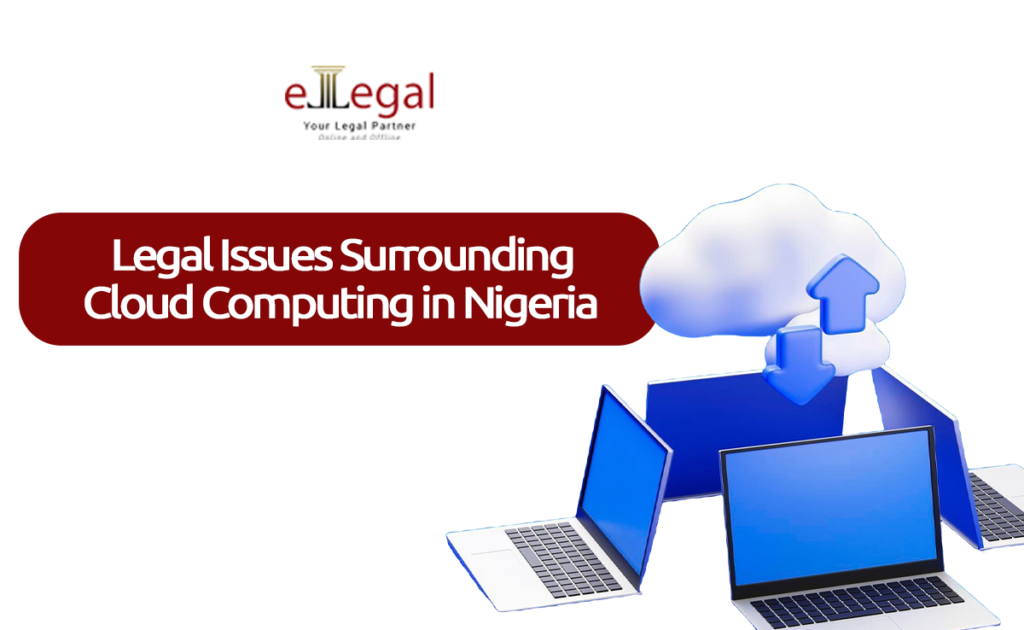Cloud computing has quickly become a game-changer in Nigeria, offering flexible, scalable, and affordable ways to store and manage data for businesses, governments, and individuals. However, as it grows, it brings along some legal challenges that need attention to keep data safe and secure. The legal framework in Nigeria is still catching up with the fast pace of technology, with various laws and policies trying to address issues like data protection, intellectual property, cybersecurity, and compliance with local regulations. This blog takes a closer look at these key legal concerns in the context of cloud computing in Nigeria.
The Nigerian government acknowledges the significance of cloud technology, incorporating it into wider national strategies like the National ICT Policy. Nevertheless, as the dependence on cloud services grows, so does the necessity to tackle the legal and regulatory issues associated with this technology. With businesses and government entities increasingly storing large quantities of sensitive information in the cloud, concerns regarding privacy, security, jurisdiction, and adherence to local regulations are becoming more urgent.
Data Protection and Privacy
One of the primary legal concerns surrounding cloud computing in Nigeria is data protection and privacy. Cloud service providers (CSPs) are often based outside of Nigeria, meaning that data is stored in foreign servers, which could be subject to different data protection regulations. The Nigerian legal framework regarding data protection is relatively new and still developing, but it raises critical issues for cloud computing.
The Nigeria Data Protection Regulation (NDPR)
The Nigeria Data Protection Regulation (NDPR), introduced in 2019, is the main law that governs how personal data is handled in Nigeria. Its goal is to protect personal data and ensure that it is processed transparently, securely, and legally. According to the NDPR, businesses in Nigeria must take steps to protect the personal data of their customers, clients, and employees.
For cloud service providers, this means they must ensure the security and confidentiality of the data they manage. If a Nigerian business uses a cloud provider for data storage and processing, the business is still responsible for complying with the NDPR, even if the data is stored outside Nigeria. This can be tricky, especially when it comes to cross-border data transfers. The NDPR permits such transfers only if the country receiving the data has strong data protection laws, or if the cloud provider offers guarantees to protect the data.
International Data Transfers
Since many cloud service providers operate globally, Nigerian businesses may face challenges in ensuring that their data complies with the NDPR when transferred to jurisdictions that lack similar data protection regulations. For example, if a Nigerian business uses a cloud provider based in the United States or Europe, there may be concerns about whether the data is adequately protected, especially in cases where foreign governments could access the data under their national laws.
The European Union’s General Data Protection Regulation (GDPR), introduced in 2018, governs how the data of EU citizens is handled. It also applies to businesses outside the EU, including Nigerian companies, that offer goods or services to EU residents, even if those services are free. For example, if a Nigerian company provides services to someone in the UK and accesses their data, the GDPR applies. If the company transfers this data to the cloud without proper consent and fails to meet GDPR standards, it can face serious consequences. Additionally, the cloud service provider involved in processing the data must comply with the GDPR, or the company will be held responsible for non-compliance.
Another major worry about data protection is the possibility that cloud service providers (CSPs) might sell data. Given the high value of data, there have been allegations against some companies for selling personal information to government bodies or rival businesses. Therefore, companies must make sure their data is well-encrypted and that they consistently update their security protocols to guard against unauthorized access or misuse.
To mitigate this risk, Nigerian businesses must ensure that their contracts with cloud service providers include appropriate safeguards for data protection, such as clauses that specify compliance with the NDPR and the use of encryption or other security measures. The concept of “data sovereignty” is also relevant here, as Nigerian businesses must be mindful of the location of the servers where their data is stored and processed.
4. Intellectual Property Issues
Intellectual property (IP) concerns are another important legal issue in the context of cloud computing in Nigeria. The storage, sharing, and processing of data on the cloud often involve the use of software, applications, and content that may be protected by intellectual property laws.
Cloud computing is also frequently used to store digital assets, including creative works such as photographs, music, and videos. Nigerian businesses and individuals who store their intellectual property in the cloud should ensure that they retain ownership of their IP and have legal rights to the data they upload. They should also be aware of the terms and conditions of the cloud provider, as some providers may include clauses that give them ownership or usage rights over the stored content.
To prevent disputes over ownership of intellectual property, businesses and content creators should carefully read and negotiate cloud service agreements. It is important to clearly define who owns the content being stored on the cloud and what rights the cloud provider has regarding that content.
Cybersecurity and Legal Liability
Cybersecurity is a key concern for cloud computing in Nigeria, as data breaches can lead to theft or unauthorized access to sensitive information. The Nigerian Cybercrime Act of 2015 criminalises activities like hacking and data breaches, requiring businesses to ensure their cloud providers follow proper security standards. If a breach occurs, both the business and the cloud provider could be held liable, and businesses must report breaches under the NDPR, potentially facing penalties if they fail to implement adequate security measures.
Cloud Service Provider’s Liability
The issue of liability in the case of a data breach or cybersecurity incident is crucial in the realm of cloud computing. While the cloud provider is typically tasked with securing the infrastructure, it is equally important for businesses to implement measures to protect the data they store in the cloud. Many cloud service agreements contain disclaimers that limit the provider’s liability in the event of a data breach, which means businesses are often left to manage their data security.
Nigerian businesses should make sure that their contracts with cloud providers clearly define the responsibilities of both parties concerning data security and incident response. This clarity can help mitigate the legal risks associated with using cloud services
Regulatory and Compliance Issues
Nigerian businesses must adhere to national policies and regulations governing ICT and cloud computing, with the National ICT Policy being a key framework. This policy focuses on promoting ICT development, ensuring the security of information systems, and establishing legal and regulatory frameworks to support cloud computing in Nigeria.
Conclusion.
In summary, cloud computing offers many advantages, but businesses, government agencies, and individuals in Nigeria must be aware of the legal implications. With careful planning, legal compliance, and cybersecurity measures, the legal challenges surrounding cloud computing in Nigeria can be successfully managed, leading to a thriving digital economy. For more information. Contact us.




